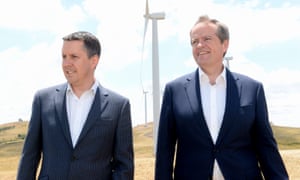Extract from The Guardian
Shadow climate change minister Mark Butler says Labor open to dealing with NEG legislation before states sign off
The shadow climate change minister Mark Butler says Labor is open to dealing with the government’s national energy guarantee legislation before the states have signed off on it.
But with the government scrambling to land a power price fix to quell an internal rebellion on the Neg and keep a lid on any leadership tensions, Butler has given an explicit warning the opposition will torpedo any new taxpayer support for coal-fired power.
Senior government figures have spent the week attempting to peel back the number of government MPs prepared to cross the floor on the Neg by expediting complementary policies, including recent recommendations by the Australian Competition and Consumer Commission, one of which includes governments under-writing new power generation investments.
But Butler has warned Labor will not back the fix if it includes supporting new coal projects.
“The idea that taxpayers would take on a risk that investors are not willing to take on I think would be a gross abuse of the political office of prime minister,” he told Guardian Australia’s politics podcast.
The shadow minister said it still was not clear what the government would ultimately bring forward to placate the dissenting backbenchers, but “if it’s about taking enormous risks with taxpayer funds, then we are going to oppose it”.
He said if the government managed to secure support elsewhere in the parliament and pressed ahead with underwriting a new coal power project in the coming months, Labor would not feel obliged to honour that commitment if it wins the next election.
"We are going to move an amendment which is 45%."
Asked whether he was prepared to weather a politically-charged debate about sovereign risk, Butler said: “We have a strong view about maintaining investor confidence in an economy like Australia that depends so much on investment, including overseas investment – but equally we have been crystal clear on this.”
Butler declared new coal power was “not good for our energy system or for our economy”. He said no one could feign surprise about this position, because Labor had been “clear about our views on that”.
Butler says Labor is open to parliamentary debate even though the states are yet to give the Neg the green light – a signal that the opposition will not make the government sweat unduly as it battles internal dissent.
But Labor will insist on a substantial Senate inquiry.
Butler said when debate comes on in parliament, Labor will attempt to change the current emissions reduction target of 26% to 45%. The Greens have declared 45% is not good enough.
“A 45% reduction in the electricity sector, according to experts, is the bare minimum required to meet Tony Abbott’s measly Paris commitments,” says the Greens climate change spokesman Adam Bandt.
Bandt says 45% is Labor’s economy-wide target for reducing pollution so its target for electricity should be higher, because it is cheaper to reduce pollution in the energy sector than in other sectors of the economy.
But Butler says “from a position of opposition, where we are only dealing with a piece of energy legislation and we don’t have advice before us about what transport can do between now and 2030, what the land sector can do, what manufacturing and mining can do ... we are going to move an amendment which is 45%”.
He also said the Neg legislation “needs to not tie the hands of future governments” and Labor would not “cop any devices to lock in low ambition”. Butler said business was already acutely aware the government’s current target would need to be lifted.
Butler says there is a clear difference between Labor and the Coalition on the degree of ambition for emissions reduction, and the opposition was comfortable fighting an election on that difference.
He said he was “very confident” Labor’s position lined up with the views of most Australians, and he said the government would have difficulty prosecuting a cost-of-living campaign against the ALP as Tony Abbott did with the carbon price in 2013 because renewables were now the cheapest source of energy.
Butler said Labor continued to develop its policy for emissions reduction across the economy. He said the policy to be released before the next federal election would include mandatory emissions standards for vehicles, and “some kind of emissions trading scheme” for liable entities – big polluters emitting more than 25,000 tonnes of carbon a year.

No comments:
Post a Comment